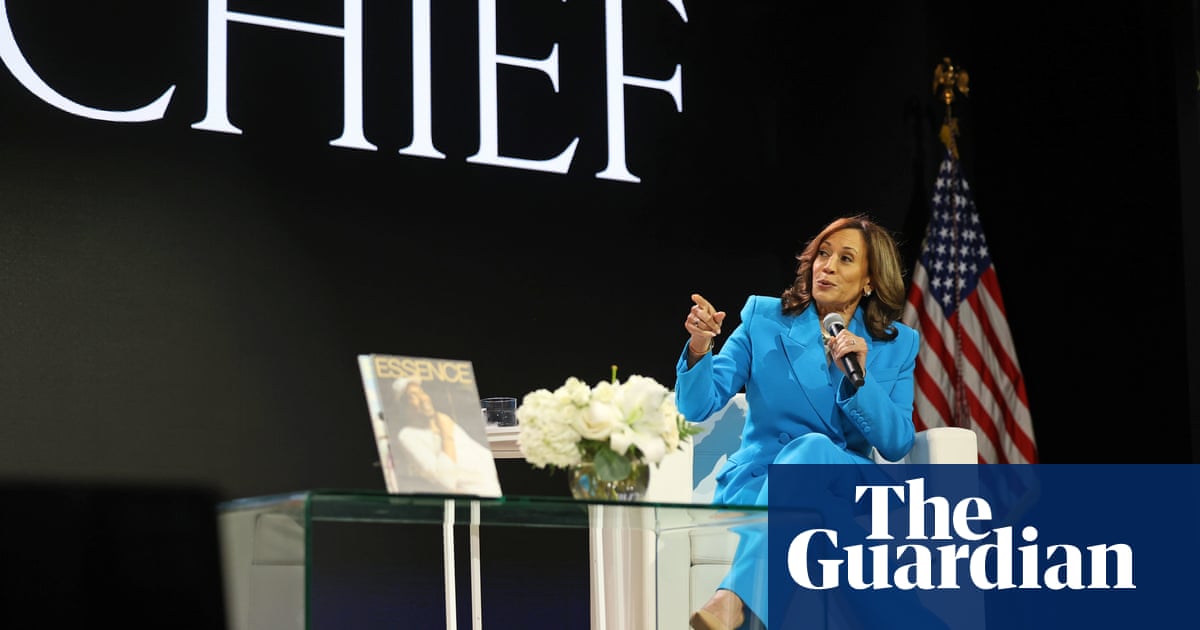
There are lots of differences between the presidential candidacies of Kamala Harris and Hillary Clinton, but, rhetorically at least, there’s one disparity that stands out. In 2008, when Clinton lost to Obama in the Democratic primaries, she referred to putting “18 million cracks in the glass ceiling”. Accepting the Democratic nomination in 2016, she said: “We just put the biggest crack in the glass ceiling.” And later that year, when she held what would turn out to be her terrible, deflated election night party, it was at the Jacob K Javits Centre, a convention hall in Manhattan that has, er, a glass ceiling. It’s notable, therefore, that several weeks into Harris’s candidacy, she’s not touching Clinton’s ceiling with a 10ft barge pole.
As a piece of imagery, the glass ceiling got very old very quickly, so that even by the time Clinton had it on heavy rotation, it was already emptied of meaning. Even without the phrase’s “all right, Grandma” vibe, it makes basic political sense for Harris to avoid using an image associated with the failed candidacy of the only other woman to be a major-party nominee for president. What’s curious is the decision her team has apparently made not only to eschew that particular phrase, but to handle with slightly more delicacy the nature of her candidacy. If Harris wins, she will, of course, not only be the first female president, but the first Black female president, and the first president, woman or otherwise, of south Asian descent. Pointing out this fact is not a major rhetorical part of the campaign.
Which isn’t to say that Harris is downplaying any aspect of her background. Trump, in an attack that, miraculously, succeeded in actually embarrassing other Republicans, accused her two weeks ago of changing identities when she “became a black person” – further proof that he’s overdue for a cognitive test. In Harris’s speech at the Democratic convention last month, she went in hard on her own biography, introducing to the American electorate her mother, who, at 19, she said, “crossed the world alone, travelling from India to California with an unshakable dream to be the scientist who would cure breast cancer”, and recalling her dad’s Jamaican heritage.
But while the speech was steeped in feminist principle around abortion and punishing abusers – Harris became a prosecutor, she said, because a high school friend was being sexually abused and she grew up wanting to nail the bastard – nowhere was the language expressly feminist or foregrounding of the unique nature of her candidacy.
I suspect this comes from studying Clinton’s defeat. Lots of people – not all of them men – don’t like the first-female-president approach. It makes them roll their eyes. It risks triggering either a speech about how girls these days outpace boys at high school and men are the underdog or, from the other direction, the observation that, without a class metric, the designation “woman” is politically meaningless. (It also risks provoking Susan Sarandon to pop up on TV to say: “I don’t vote with my vagina.” Literally nobody wants this.)
Also: it’s boring. The facts are self-evident. Harris is a woman of colour on the left in a country where, of the last 46 presidents, all but one has been a white man. She does not need to go the vote-for-me-to-make-history route, which risks sounding either narcissistic or victim-claiming, while reminding extremely large constituencies in the US just how much they hate women in general and powerful women in particular. It is an avoidance that also seems tailored to meet Trump’s particular and very successful brand of misogyny. Somehow, the fact Harris hasn’t made a big thing of being a woman is denying Trump an opportunity to do the same.
Instead, Harris lets the optics do the work for her and wears the various aspects of her identity lightly. “I stood up for women and children against predators who abused them,” she said at the convention, trying to spin her role as a prosecutor away from the cop-like end of the spectrum towards something that sounds more heroic and nurturing. But in general, and in terms of the way she uses her own personal history to engage voters, Harris has emphasised coming from the middle class far more than being a woman; and, for my money, it seems to be working.
As for Clinton, God love her, she’s still ploughing on with the glass ceiling thing. At the Democratic convention, she referred to Harris’s candidacy as the “highest, hardest glass ceiling”. And fair play to her. She isn’t wrong, factually, even if politically she may be off base. The fact remains: that if the Harris team’s instincts and calculations are right, it may turn out that the best way to smash the glass ceiling is to ignore it altogether.
Emma Brockes is a Guardian columnist












